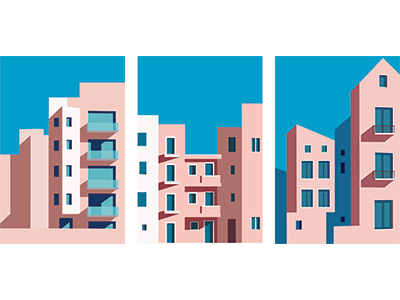Buying a Converted Property
When buying a converted property, you need to undertake additional checks to ensure it meets current building regulations, is valued correctly, and is converted to a good standard. With any major construction work, there are risks that could make the property less valuable.
There are 3 things you can do to reduce the risk:
- Conveyancing Searches. The Local Authority Search will confirm what works have been signed off at Building Control. We can order this for you before you buy the property. Order a Local Authority Search.
- Solicitor. Was the conversion legal, or did it breach any covenants on the title? Your conveyancing solicitor will advise you of what information you need to satisfy your mortgage lender and allow you to sell the converted property in the future.
- RICS Surveyor. A RICS Surveyor should be employed to review the quality of the conversion and identify any structural defects. We have local RICS surveyors for you. Get a RICS Surveyor Quote.
There were 3,850 net conversions in England during the 2024–25 financial year. This refers specifically to subdividing houses into flats.
Source: Ministry of Housing, Communities and Local Government (MHCLG)
What is a converted property?
A converted property is a building that has been altered from its original purpose into one or more residential dwellings. For example, commercial buildings such as office blocks and shops, industrial buildings such as factories, and agricultural buildings such as barns.
Whether or not you are relying on a mortgage to purchase a converted home, you should consider these common reasons that a mortgage may be refused, and weigh this carefully into your decision to buy.
- National coverage with local RICS surveyors.
- Rated Excellent on Trustpilot.
- We handle the booking.
- Same week availability.
Why would my mortgage be refused on converted property?
Non-standard construction
Commercial and industrial buildings often use non-standard construction, such as concrete or steel. Many lenders will refuse to mortgage non-standard homes as they are higher-risk and harder to insure.
Flats above commercial premises
Lenders may be reluctant to mortgage flats or maisonettes above commercial property, such as shops or restaurants, due to the greater risk of fire and break-ins due to shared access rights.
Brownfield sites
Brownfield sites may have issues with contaminated land from industrial use. Your conveyancing solicitor can conduct a search to see if there have been contaminated land issues nearby, and if the land has since been decontaminated.
Character homes
Converted character buildings such as churches, lighthouses, fire stations and others may need a mortgage from a specialist lender, due to unique challenges specific to the building.
Size under 37 square metres
If the conversion were completed under permitted development rights, it would not have been subject to the government's minimum space standard, requiring residential dwellings to be no smaller than 37 square metres. Some mortgage lenders will not lend on dwellings under 37 square metres, while others will have a lower acceptable minimum of 30 square metres.
External condition
Tall buildings such as ex-office blocks may have unsafe external cladding. If so, lenders will often refuse to lend unless the lease qualifies for leaseholder protections with an accompanying deed of certificate; or is otherwise exempt because it has an EWS1 with classification A or B1; or the developer has committed to remedy the issue themselves.
Leaseholder restrictions (if applicable)
As with any Leasehold, the lender will likely refuse to lend if the remaining term on the lease is too short, the service charges are too high, or there are other unreasonable restrictions on the title.
Repair bills on older constructions
The lender may refuse on affordability grounds if unreasonably high repair costs are anticipated, for example, where a factory building has been converted into leasehold flats, which bear responsibility for maintaining its listed industrial chimney. This may also be the case in some period conversion flats, if, for example, a huge listed roof needs to be replaced, imminently.
Planning permission
Lenders may refuse to lend on conversions that breach planning permission, as, in the worst case, the local authority could force the current owner to return the property to its original state. In most cases, however, they will consent to lend if you can get sufficient indemnity insurance. Unless the local authority is already aware of the works or breach.
In 2013, the government added office-to-residential conversions to permitted development rights, meaning developers only had to seek 'prior approval' as opposed to full planning permission. This resulted in some tiny flats, some even without natural daylight.
In 2020, the government introduced a new law requiring all office-to-residential conversions to receive daylight
Since 2021, all new permitted development right conversions have to meet the Nationally Described Space Standard (NDSS) of 37 square metres minimum.
In the 2023 Autumn Statement, the government announced a plan to consult on a new PDR that would allow houses to be converted into two flats, provided the exterior façade remained unchanged. Although the consultation took place in early 2024, the legislation was not implemented before the subsequent general election and change in government. Recent updates to the General Permitted Development Order (GPDO) in May 2025 focused on renewable energy (heat pumps) and electric vehicle charging, but did not include the "house-to-flats" right.
Building regulations
Lenders will refuse to lend against a property that breaches building regulations, as it may be unsafe. In some cases, they will be satisfied with indemnity insurance to protect against the cost of enforcement action.
Should I buy a converted property?
There are many desirable converted properties to choose from, as long as you place your offer carefully. As always, we advise due care and diligence; choose a good conveyancing solicitor, get a RICS home survey to flag any defects, and inspect the property thoroughly to ensure it will suit you.
To get a mortgage where a high-street lender has refused, you may need to consult with our 100% impartial mortgage broker, who will present your best options. If very limited lenders or products are available for the property, it may be best to pull out, as you could end up in a corner when you come to remortgage or sell up.
Our brokers will present the best options available to you, for any type of mortgage, including:
- First-time buyers, home movers and buy-to-lets;
- Employed; self-employed or director mortages;
- Mortgages for non-UK residents or non-UK citizens;
- Bridging loans;
- Bad credit mortgages;
- Guarantor mortgages;
- Joint borrower, sole proprietor mortgages; and
- Absolute, Possessory, Good, or Qualified Title.
Caragh is an excellent writer and copy editor of books, news articles and editorials. She has written extensively for SAM for a variety of conveyancing, survey, property law and mortgage-related articles.
Andrew started his career in 2000 working within conveyancing solicitor firms and grew hands-on knowledge of a wide variety of conveyancing challenges and solutions. After helping in excess of 50,000 clients in his career, he uses all this experience within his article writing for SAM, mainstream media and his self published book How to Buy a House Without Killing Anyone.











